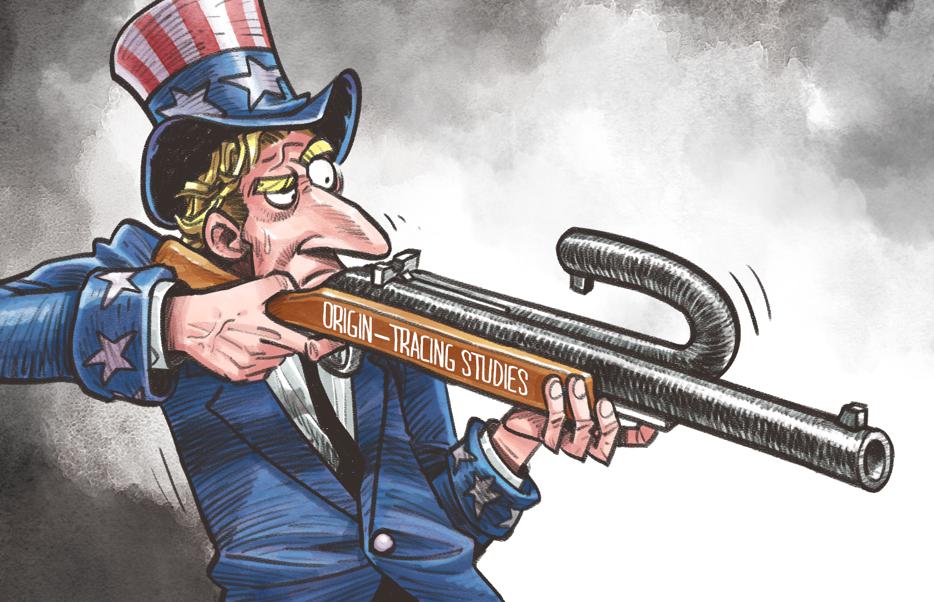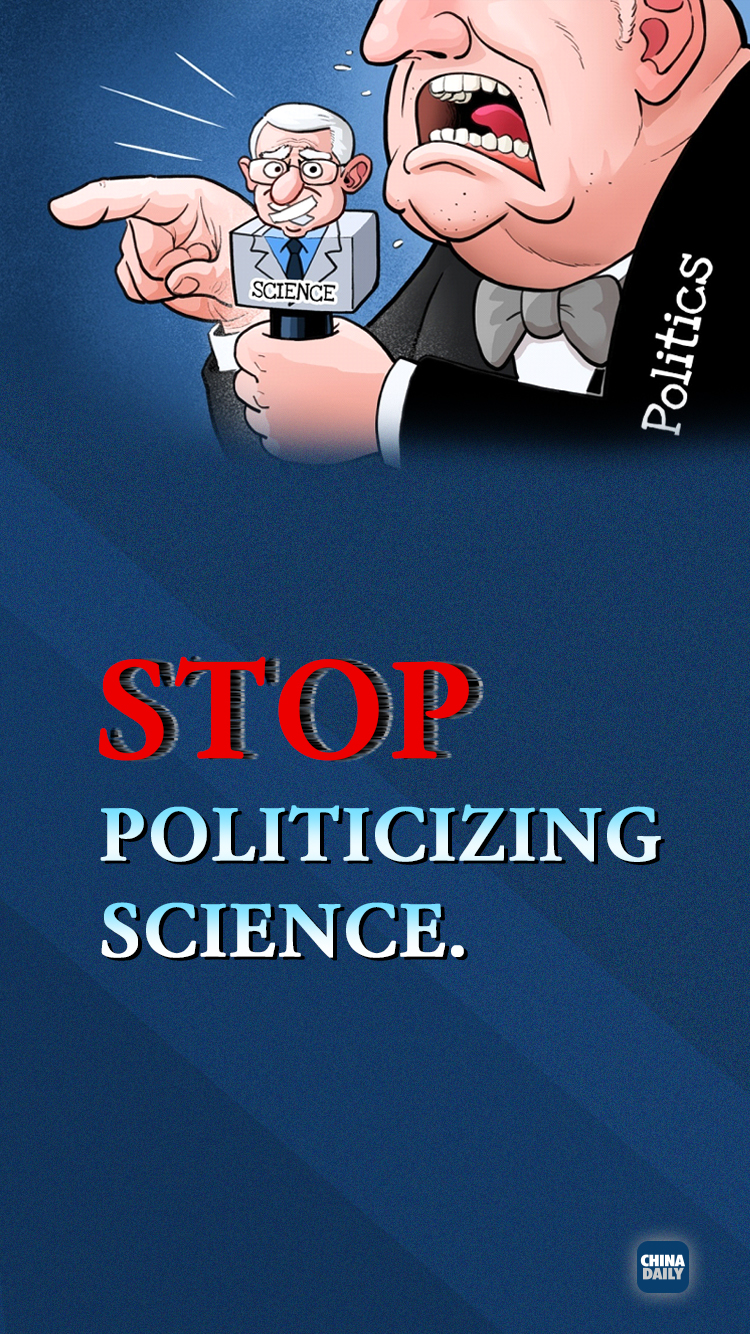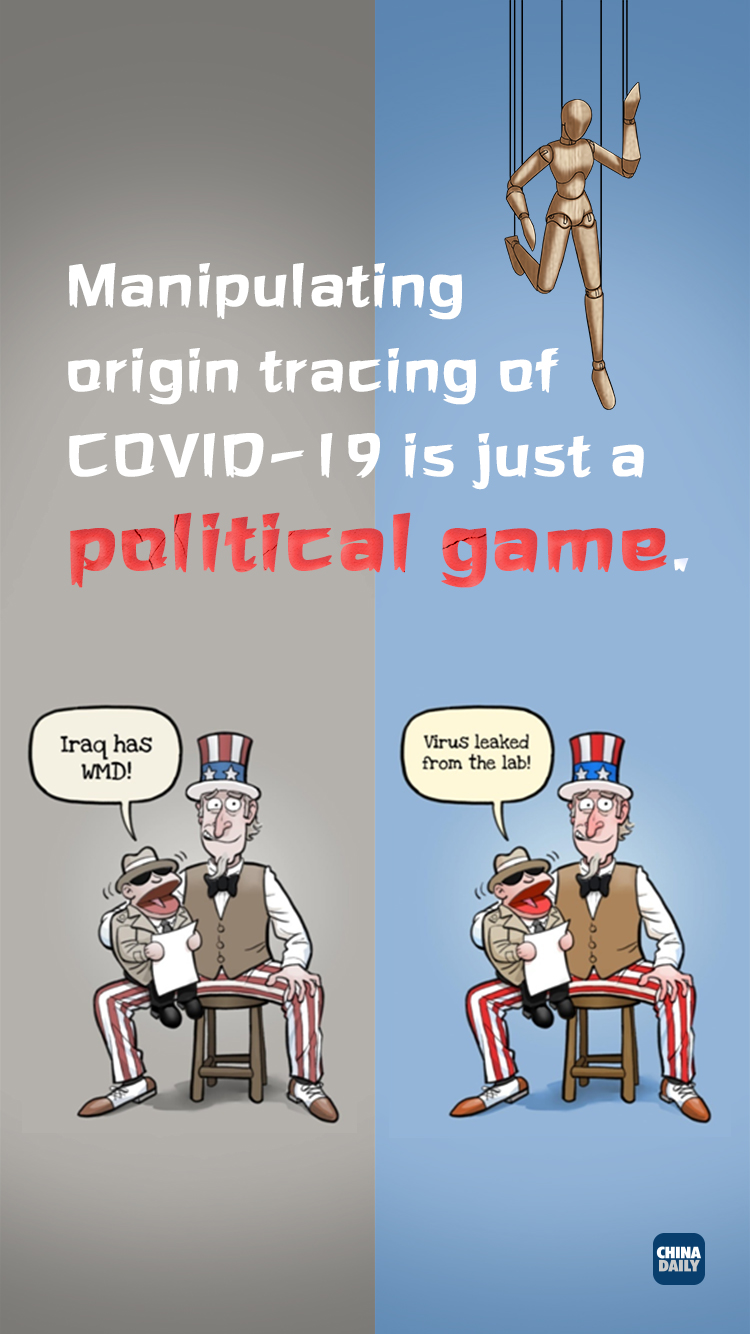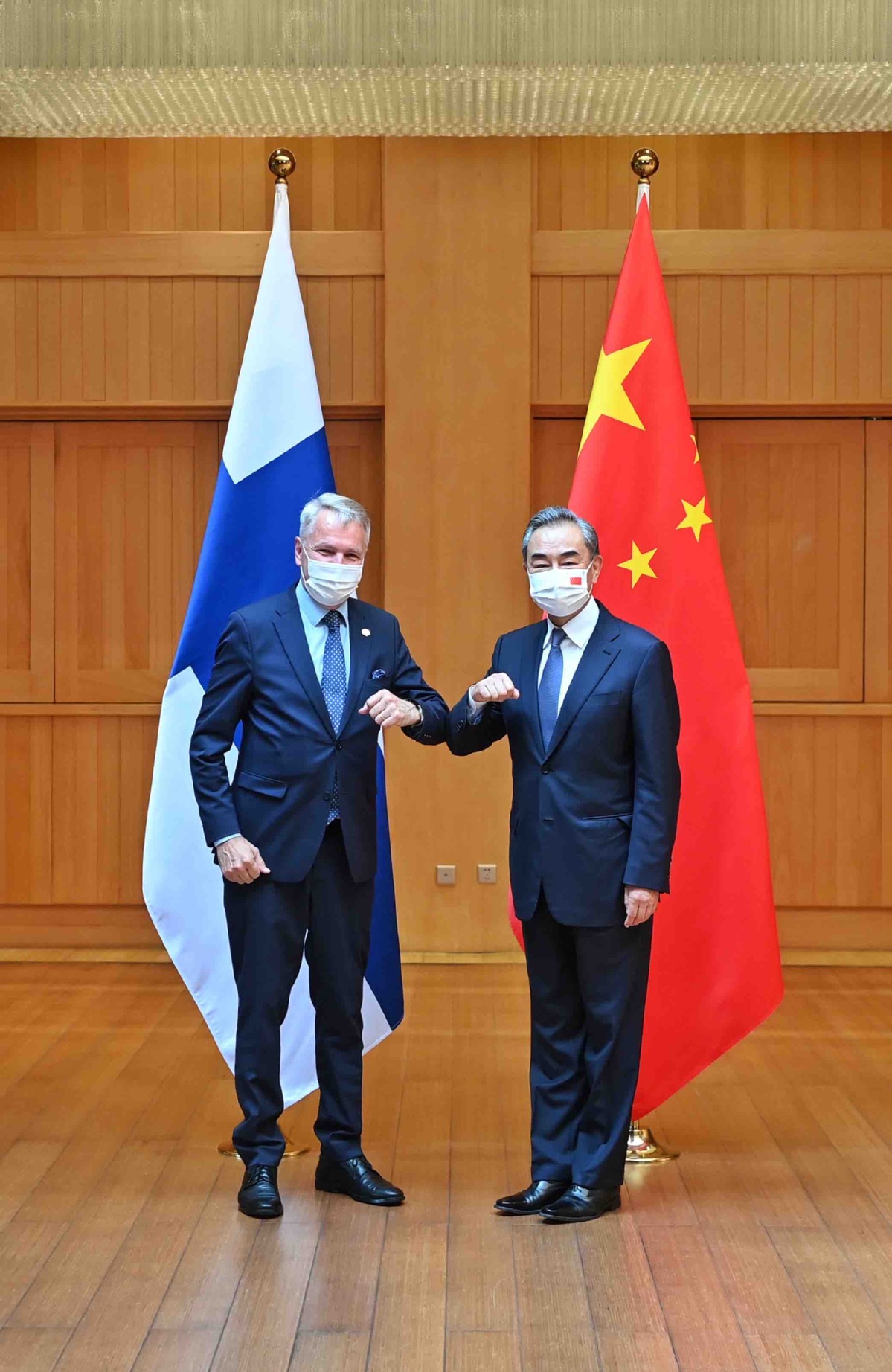



Top officials at the World Health Organization say there's not enough evidence to show that third doses of vaccines are needed and appealed for the scarce shots to be shared with poor countries that have yet to immunize their people, instead of being used by rich countries as boosters.

Kishore Mahbubani, former ambassador of Singapore to the United Nations, has called for the origin-tracing efforts of COVID-19 to expand beyond China as the origins of the global health crisis remain contested by experts.
"It's not fair to say that China should allow access, and other countries should not allow access," Mahbubani said in a recent interview with the Global Times.
"Therefore, the US should declare that it is willing to allow WHO teams to access any facilities in the country. In that way the US will set an example for others to follow."
Leaving COVID-19 to spread unchecked, the US gives the virus a chance to mutate and makes the pandemic last longer than many of its own citizens would like. While rich countries sit on an excess of vaccines that will expire in summer, poor countries wait sometimes decades for lifesaving support.

More than 80 percent of respondents to a survey gauging opinions from around the world believe that efforts to trace the origins of the coronavirus have become politicized.
The survey, held by CGTN Think Tank, was available on main social media platforms in the UN's six official languages: Chinese, English, Russian, French, Spanish and Arabic. It was conducted from Saturday morning to 10 pm on Sunday.
On Twitter, 90 percent of Spanish-speaking netizens agreed that politics was competing with science on the issue. Taking the same view on the platform are 88 percent of French speakers, 83 percent of Russian speakers, 70 percent of English speakers and 68 percent responding in Arabic.
On Facebook, the position was held by 83 percent of those responding in English, Spanish, French, Arabic and Russian.
On Weibo, as many as 95 percent of the respondents believe the issue has been politicized, showing a high degree of consensus.
In analyzing the poll, officials at the think tank found certain keywords appeared frequently in people's comments: "political pressure","US sanctions", "media control", "economic compensation" and "prevent the development of China".
The second of three questions in the poll was "Do you support investigations into the origins of COVID-19 in multiple countries?"
Some 83 percent of those responding in English, Spanish, French, Arabic and Russian on Twitter support the proposition. On Facebook, 79 percent agreed with the question; on Weibo, it was 93 percent.
In response to the question "What is the most pressing task to combat COVID-19 on a global scale?", a large number of respondents chose the option of expanding vaccine supply, intensifying medical treatment and imposing a lockdown in areas with outbreaks. Two other options available to respondents were actions to immediately begin efforts to trace the origin of the virus and lift travel bans.
They largely left aside the option of immediate origin tracing of the virus with a high degree of unanimity. On Twitter, only about 17 percent of respondents agreed with that option; on Facebook, only 2 percent of Spanish speakers did so.
Blame game
The findings come as the United States steps up the blame game against China. It has questioned the conclusions from the Joint Report of the World Health Organization-convened global study into the origins of SARS-CoV-2 released at the end of March. The report was based on joint research with China.
Politicization of efforts to determine the origin of the coronavirus is unpopular around the world. Almost 60 countries have sent letters to the World Health Organization agreeing with the results of the first phase of origin-tracing research and opposing the attempts to politicize the issue.
Finnish Foreign Minister Pekka Haavisto said Finland advocates that origin tracing should be conducted scientifically.
Portuguese Foreign Minister Augusto Santos Silva said the purpose of the research is for countries to be better prepared for future circumstances.
He said Portugal wants to see studies conducted in a scientific and professional spirit, and the country does not support any act of politicizing the origin tracing or the WHO's work.
Gerardo Lopez Perez, a Mexican epidemiologist, said the US has again raised the issue of origin tracing mainly out of self-interest.
Xinhua contributed to this story.

US evolutionary biologist Michael Worobey has been firming up his opinion on the origins of the coronavirus since May, when he was among 17 scientists calling for an investigation that covered both natural source and lab-leak hypotheses.
Some two months after that appeal, published as a letter in the journal Science, the University of Arizona scientist said the newly emerging evidence has convinced him that natural origin is the more compelling explanation for the virus.
With this shift in thinking, Worobey joined 21 other scientists to publish a paper-The Origins of SARS-CoV-2: A Critical Review-in early July. "The most parsimonious explanation for the origin of SARS-CoV-2 is a zoonotic event," the scientists concluded, in referring to the name of the virus behind the pandemic. A zoonotic virus is one that crosses from animals to humans.
The authors of the review, led by Edward Holmes from the University of Sydney, are scientists from universities and research institutes in countries including the United States, the United Kingdom, New Zealand, Austria, Australia and China.
The May letter stated that in an investigation by the World Health Organization into the origins of the virus, there were no findings in clear support of either a natural spillover or a lab accident. They thought that the two theories weren't given balanced consideration and "we must take hypotheses about both natural and laboratory spillovers seriously until we have sufficient data".
The May letter was taken as evidence by some media that the scientists were advocating lab-leak theories. That's not what they meant, according to Worobey.
"Why am I on both papers? The answer is not that I've undergone a dramatic conversion. I've always thought a zoonotic emergence was more likely than a lab leak. In light of recent evidence/thinking, I simply view it as even more likely,"Worobey wrote on Twitter recently.
Pamela Bjorkman, a biology professor who also signed the May letter, recently wrote a letter to This Week in Virology and expressed her regret in signing the May letter.
Bjorkman said she signed the letter to prompt "more funding for searching for natural viruses in animal reservoirs".
"Perhaps naively, I did not anticipate that the letter would be used to promote the lab-origin hypothesis," she said. "I now think that I should have realized this would happen and should have been more proactive-either not signed the letter at all or else requested more wording changes to make my position clear."
Second thoughts
Worobey said a couple of things moved his thinking about the origin of COVID-19.
First, Shi Zhengli of the Wuhan Institute of Virology, or WIV, and other Chinese scientists recently published a paper concerning the genomes of several bat SARS-related coronaviruses from the same mine in Yunnan province where RaTG13-closest to SARS-CoV-2-came from. He found that the genomes turned out to be less close to SARS-CoV-2.
Another recently published study also helped to move Worobey's thinking. Xiao Xiao, Chris Newman and three other scientists traced animal sales from 17 shops in Wuhan's wet markets.
The study documented "47,381 individuals from 38 species, including 31 protected species sold between May 2017 and November 2019 in Wuhan's markets", according to the paper published in Nature.
Worobey said that traded animals such as raccoon dogs and civets are "plausible intermediate hosts".
Worobey told NPR that his colleague Robert Garry, a microbiologist at Tulane University, took data from the WHO and plotted it on a map showing where people with infections lived in Wuhan.
The data model shows that early COVID-19 cases in Wuhan started near the Huanan Seafood Wholesale Market. The map showed virtually no cases near the WIV, which is over 16 kilometers from the market.
"There are no cases around the WIV," Worobey said. "If the outbreak did start in the lab, the bottom line is, it would be odd for it not to be spreading from there rather than from elsewhere."

China has submitted a proposal to the World Health Organization for the second phase of the COVID-19 origin study in an effort to support and coordinate with the organization in tracing the origins of the virus globally, Foreign Ministry spokesman Zhao Lijian said on Thursday.
The plan emphasizes that the investigation should be led by scientists, based on evidence and carried out in multiple places around the world, Zhao said.
"It is a science-based and professional plan that can stand the test of practice," he told reporters at a regular news briefing in Beijing.
Zhao said the Chinese plan was submitted before the WHO Secretariat unilaterally proposed a phase-two study plan, which has not received the unanimous consent of its member states and has drawn concern and opposition from many countries, including China.
The WHO's plan cannot be the basis for the phase-two study because it runs counter to the conclusions and suggestions of the WHO-China joint study report issued in March and fails to reflect the latest outcomes of global origin-tracing research, he said.
The spokesman said that origin-tracing is a serious scientific matter that should be investigated by scientists, adding that political manipulation of the issue must be firmly rejected.
On Wednesday, US Secretary of State Antony Blinken said while meeting with WHO Director-General Tedros Adhanom Ghebreyesus that the next phase of study should be evidence-based, transparent and led by experts.
Zhao said that despite such claims, Washington is in fact engaged in practicing terrorism under the pretext of origin-tracing by spreading rumors falsely accusing China of a lab leak, trying to link China and even Asian countries to the virus, and suppressing scientists who are trying to make the voice of justice heard.
In response to Blinken's call for additional origin study in China, Zhao said that the Chinese side believes that investigations that have been carried out in phase one of the study, especially those with clear conclusions, should not be done again.
While the pandemic has infected some 35 million in the United States and taken more than 610,000 lives, the US government did not conduct any probe of COVID-19 origins at home, such as investigating Fort Detrick for a lab leak, he said.
As of Thursday, an online petition for a probe of the Fort Detrick lab had gathered more than 18 million signatures.
"If the US really wants to support the origin-tracing study, then it should answer this call to invite WHO experts for an investigation in the US in an open and transparent manner," Zhao said.

Governments, scientists and media outlets have called for a science-based approach to tracing the origins of the coronavirus while speaking out against the politicization of the issue.
Their comments came amid intensified efforts by the United States to spread disinformation on the subject.

The US has attempted to politicize the origin tracing of COVID-19 by distorting the facts and shifting the blame onto China.
Washington played the "blame game" and questioned the conclusions from the joint report of the WHO-convened global study of the origins of SARS-CoV-2 at the end of March, based on joint research with China.
Related: Science in and politics out
In July 2019, the Fort Detrick Lab was shut down, following an order from the CDC. After that, there were unexplained health incidents in various states in the US.
The US politicizing the origin probe of the COVID-19 virus will not win any hearts and is doomed to fail, Zhao Lijian, spokesman of China's Ministry of Foreign Affairs, said in a news briefing on Wednesday.
On Monday, an international online survey done by CGTN Think Tank showed that 80 percent of those interviewed believe the origin probe has been politicized. The survey is available in several UN official languages, including Chinese, English, Russian, French, Spanish and Arabic.
"This shows the strong discontent by people around the world on the US politicizing the investigation of the origins of COVID-19," he said.
Survey participants have conveyed the message that the investigation has not contributed to the containment of the COVID-19 pandemic and it is merely a useless and ignorant political ploy by the US to contain the rise of China, Zhao said.
To dodge its responsibility for mishandling the pandemic, the US has smeared other countries, politicized COVID-19, and seriously undermined the global effort to fight the pandemic and the scientific effort to understand the virus's origin, he said.
"The US has twisted facts, spread misinformation, disregarded conclusions reached by the WHO-China joint research team, and referenced politicians and an intelligence report with no real supporting evidence to hype the notion that the virus was leaked from the Wuhan Institute of Virology," Zhao said.
The US commissioning the intelligence agency to investigate the origin of the virus is neither scientific, objective, or rigorous. "It is a political farce from start to finish," he said.
Meanwhile, the US has been coercing scientists to support its lab leak hypothesis with threats and pressure. It is reported that those who do not fall in line are attacked, threatened and some even have to relinquish their position to uphold their scientific truth, Zhao said.
Zhao said the US politically manipulating the origin probe has received wide-spread opposition from the international community.
"We solemnly inform the US, in face of facts, science and justice, political manipulation will not win hearts, and is doomed to fail," he said.
Researchers at the University of Washington estimate that approximately 60 percent of US coronavirus cases may have gone unreported due to some major drawbacks, including biases in test data and delayed reporting, according to a study published on Monday in the Proceedings of the National Academy of Sciences.
Editor's note: The US administration is once again playing up the issue of the novel coronavirus' origin to blame China, despite the fact China has taken every possible measure to halt the spread of the virus. Experts agree, and call for an end to politicizing outbreak origin tracing.
Producer: Xing Zhigang
Supervisors: Zhu Ping, Zhang Chunyan, Song Wei
Video editor: Zhao Manfeng
?
?
48 countries have sent letters to the World Health Organization Director-General Tedros Adhanom Ghebreyesus opposing the politicization of the efforts to trace the origin of the novel coronavirus outbreak. Experts expressed the same stance and called for stopping politicizing virus origins.?
Reporter:Wang Xiaoyu
Illustrations: Luo Jie, Cai Meng
Video: Sun Xiaoyu
Producers: Zhu Ping, Zhang Chunyan, Song Wei?
Supervisor: Xing Zhigang

US blaming others for failures harms research efforts, state councilor says
State Councilor and Foreign Minister Wang Yi has stressed the need to look into the origin of the "political virus" while tracing that of the coronavirus that caused the COVID-19 pandemic, reiterating that efforts to trace the origins of the coronavirus should not be politically manipulated.
Wang made the remarks at a joint news conference with Finland's Foreign Minister Pekka Haavisto in Chengdu on Sunday.
The United States has, from the very beginning, attempted to politicize the pandemic, stigmatize the virus and use origin tracing as a tool to practice political manipulation, Wang said.
The US neglects scientists' painstaking efforts, resorts to intelligence means for the purpose of so-called origin-tracing, and keeps hyping the "lab leak" theory, he said.
Washington's purpose is very clear, Wang said: it wants to blame others for its inability to curb COVID-19 while realizing its political purpose of smearing and suppressing other countries. It is necessary to put such an "ugly page" into the historical record of humankind's fight against the pandemic, he said.
It seems that since the US returned to the World Health Organization it has not focused on joining the international fight against the pandemic, but has continued to use the platform to spread the political virus, Wang said.
He reaffirmed that China cannot accept the WHO's plan for a second phase of a study into the origin of the virus, saying such a plan has shocked many scientists.
It deviates from the resolution of the 73rd session of the World Health Assembly and neglects the conclusions and proposals of the joint WHO-China investigation report, he said.
A joint WHO-China investigation mission conducted earlier this year concluded that transmission of the virus to humans through an intermediate animal was the likely cause and that a laboratory leak was "extremely unlikely" to have been the cause.
Truth instead of lies
If a work plan does not truly aim to look into the origin of the virus, but attempts to discredit China, the country, as an independent sovereign state will not, and cannot, accept it, Wang said, adding that about 60 countries have written to the WHO to express their opposition to politicizing efforts to find the origins of the virus.
He reiterated that in terms of such work countries should seek to work with one another instead of discrediting others, and that there should be truth instead of lies and respect for science rather than political manipulation.
China is ready to uphold the spirit of openness, transparency, science and collaboration, and to continue to support and take part in virus origin tracing efforts worldwide, he said.
